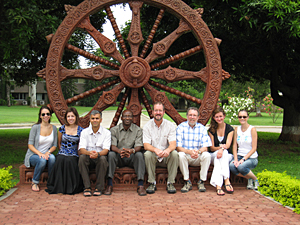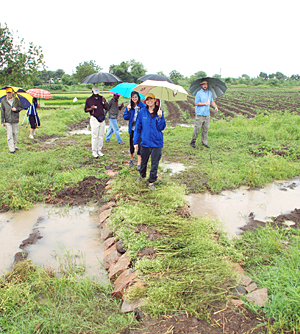

ADVERTISEMENT
- Rozovsky wins prestigious NSF Early Career Award
- UD students meet alumni, experience 'closing bell' at NYSE
- Newark Police seek assistance in identifying suspects in robbery
- Rivlin says bipartisan budget action, stronger budget rules key to reversing debt
- Stink bugs shouldn't pose problem until late summer
- Gao to honor Placido Domingo in Washington performance
- Adopt-A-Highway project keeps Lewes road clean
- WVUD's Radiothon fundraiser runs April 1-10
- W.D. Snodgrass Symposium to honor Pulitzer winner
- New guide helps cancer patients manage symptoms
- UD in the News, March 25, 2011
- For the Record, March 25, 2011
- Public opinion expert discusses world views of U.S. in Global Agenda series
- Congressional delegation, dean laud Center for Community Research and Service program
- Center for Political Communication sets symposium on politics, entertainment
- Students work to raise funds, awareness of domestic violence
- Equestrian team wins regional championship in Western riding
- Markell, Harker stress importance of agriculture to Delaware's economy
- Carol A. Ammon MBA Case Competition winners announced
- Prof presents blood-clotting studies at Gordon Research Conference
- Sexual Assault Awareness Month events, programs announced
- Stay connected with Sea Grant, CEOE e-newsletter
- A message to UD regarding the tragedy in Japan
- More News >>
- March 31-May 14: REP stages Neil Simon's 'The Good Doctor'
- April 2: Newark plans annual 'wine and dine'
- April 5: Expert perspective on U.S. health care
- April 5: Comedian Ace Guillen to visit Scrounge
- April 6, May 4: School of Nursing sponsors research lecture series
- April 6-May 4: Confucius Institute presents Chinese Film Series on Wednesdays
- April 6: IPCC's Pachauri to discuss sustainable development in DENIN Dialogue Series
- April 7: 'WVUDstock' radiothon concert announced
- April 8: English Language Institute presents 'Arts in Translation'
- April 9: Green and Healthy Living Expo planned at The Bob
- April 9: Center for Political Communication to host Onion editor
- April 10: Alumni Easter Egg-stravaganza planned
- April 11: CDS session to focus on visual assistive technologies
- April 12: T.J. Stiles to speak at UDLA annual dinner
- April 15, 16: Annual UD push lawnmower tune-up scheduled
- April 15, 16: Master Players series presents iMusic 4, China Magpie
- April 15, 16: Delaware Symphony, UD chorus to perform Mahler work
- April 18: Former NFL Coach Bill Cowher featured in UD Speaks
- April 21-24: Sesame Street Live brings Elmo and friends to The Bob
- April 30: Save the date for Ag Day 2011 at UD
- April 30: Symposium to consider 'Frontiers at the Chemistry-Biology Interface'
- April 30-May 1: Relay for Life set at Delaware Field House
- May 4: Delaware Membrane Protein Symposium announced
- May 5: Northwestern University's Leon Keer to deliver Kerr lecture
- May 7: Women's volleyball team to host second annual Spring Fling
- Through May 3: SPPA announces speakers for 10th annual lecture series
- Through May 4: Global Agenda sees U.S. through others' eyes; World Bank president to speak
- Through May 4: 'Research on Race, Ethnicity, Culture' topic of series
- Through May 9: Black American Studies announces lecture series
- Through May 11: 'Challenges in Jewish Culture' lecture series announced
- Through May 11: Area Studies research featured in speaker series
- Through June 5: 'Andy Warhol: Behind the Camera' on view in Old College Gallery
- Through July 15: 'Bodyscapes' on view at Mechanical Hall Gallery
- More What's Happening >>
- UD calendar >>
- Middle States evaluation team on campus April 5
- Phipps named HR Liaison of the Quarter
- Senior wins iPad for participating in assessment study
- April 19: Procurement Services schedules information sessions
- UD Bookstore announces spring break hours
- HealthyU Wellness Program encourages employees to 'Step into Spring'
- April 8-29: Faculty roundtable series considers student engagement
- GRE is changing; learn more at April 15 info session
- April 30: UD Evening with Blue Rocks set for employees
- Morris Library to be open 24/7 during final exams
- More Campus FYI >>
1:09 p.m., Aug. 31, 2010----Providing safe, nutritious food for growing world populations can take its toll on natural resources, especially in developing countries.
Led by Shreeram Inamdar, associate professor of bioresources engineering, three faculty members and four students in UD's College of Agriculture and Natural Resources (CANR) are using the U.S. and India to look at ways in which sustainable management practices can help boost agricultural production with the environment in mind.
Over the summer, the team embarked on a 10-day study visit to India as part of a project funded by the International Science and Education program of the U.S. Department of Agriculture (USDA).
UD is working in collaboration with the United Nations (UN) International Crop Research Institute for the Semi-Arid Tropics (ICRISAT), with headquarters near Hyderabad, India.
“The intent of the project is to enhance and enrich the knowledge of students and faculty in the U.S. about sustainable management practices being adopted in developing countries, such as India, and spawn new international research collaborations,” says Inamdar.
The students, all from the CANR, included Rachael Vaicunas, Kathryn Zook, Alison Kiliszek and Jennifer Popkin. They were accompanied by Inamdar and Titus Awokuse, associate professor of food and resource economics; David Hansen, associate professor of plant and soil sciences; and Tom Sims, professor of plant and soil sciences and deputy dean of the college.
ICRISAT has established a number of benchmark watersheds in India, China and Southeast Asia and has implemented a suite of management practices to demonstrate the value of sustainable watershed and agricultural management.
Implementation of these conservation practices has had a significant impact on the crop yields, agricultural revenues, soil fertility and carbon storage, soil moisture and groundwater yields, runoff water quality, wildlife habitat, and socioeconomic conditions of the watershed communities.
Through a summer internship program funded by the project in 2009, the four students conducted extensive research into the various sustainable management practices implemented by ICRISAT and the impacts these practices had on water and environmental quality, crop productivity, ecology and socio-economic conditions in the targeted watersheds.
The students also evaluated the policy and international trade implications of these agricultural practices. In addition, they looked at how the watershed conditions and agricultural practices in India and other developing countries were similar or different from the conditions in the US.
As a part of this internship, the students and professors developed “teaching modules” that are now being used to enrich the curriculum of eight existing UD courses with international content -- one of the key objectives of the project.
An online, stand-alone course on “Sustainable Watershed Management in Developing Countries” is also currently being developed using the teaching and information modules developed by the students.
“The visit to India was the second part of the project and was intended to provide the students and faculty a first-hand experience of the agricultural conditions and watershed practices in India,” says Inamdar. “The timing of the visit during the Monsoon season in India was intentional so that the students and faculty could see the watersheds, rainfall and runoff processes, and agricultural practices in action.”
During their time at ISCRISAT headquarters the group visited with various research teams and laboratories at ICRISAT and explored the on-campus experimental watershed and agricultural conservation practices.
“We traveled to a remote village not too far from headquarters to see the impact of the conservation practices on agricultural communities and got to meet the farmers,” says Vaicunas. “It was great to be able to connect all of our research and the topics that we included in our teaching modules to on-the-ground projects.”
Following their stay in Hyderabad, the UD group travelled to New Delhi to visit with scientists and faculty at The Energy Resources Institute (TERI) Center and the TERI University and discuss potential graduate study programs, research opportunities, exchange of students, and joint study courses between the two institutions in the areas of natural resource management, biotechnology and plant biology, and environmental policy and international economics.
Follow-up visits by ICRISAT and TERI scientists are now being planned to further their collaborations and partnerships with UD.
“The sustainable watershed project meshes well with the principles of UD's Path to ProminenceTM -- strengthening global and University-wide partnerships, expanding the cultural and social perspectives of our students, looking towards the future of the planet, and promoting the professional development of our faculty and staff,” says Sims. He adds, “It is an exciting time for us to embark on such projects.”
Additional information on the project including teaching modules, online course, pictures and experiences from the India study visit are available on the project website.


